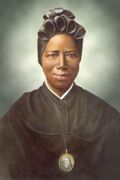- Home
- About Us
- Our Houses
- Bakhita
Bakhita

St Josephine Bakhita (1869 – 1947)
Perseverance, Hope and Forgiveness
“If I were to meet the slave traders who kidnapped me and even those who tortured me, I would kneel and kiss their hands, for if that did not happen, I wouldn’t be a Christian today.”
St Josephine was rightly a very popular choice for one of our house saints, representing so much of what our young people admire and yearn for as well as capturing the reality of oppression and history. A courageous and forgiving woman of colour who suffered immensely yet never allowed the evil of others to dampen the spirit of who she was, a child of God - loved, chosen, unique and special.
St Josephine Bakhita is such an inspiration to us because of her ability to show love and forgiveness even though she was treated with such hatred.
- Gladys, Year 7
Her life was filled with pain, both physically through the torture she encountered at the hands of her captors, and mentally as she was denied familial relationships and love growing up. Yet the legacy of this courageous and gentle saint reminds us that within the heart of every enslaved person is the divine image yearning to be free, for “the glory of God is a human being fully alive,” as St Irenaeus so forcefully declared.
Born in the late 19th century Sudan, at the age of nine Josephine was kidnapped by Arab slave traders and made to walk bare foot 600 miles to the slave market. She endured a succession of brutal ‘owners’ who degraded, tortured, and, in a manner alike many traffickers today, branded her with tattoos denoting ownership. She was sold and traded so much that she even forgot her name. Eventually she became servant to a noble Venetian family, who took her to Italy, where she served as the children´s much beloved nanny.
Because the family needed to tend to their business interests in Africa, however, St. Josephine was left at the Institute of the Catechumens for a year, in the care of the Canossian Sisters. For the family who wanted to hold on to their slave, this was a big mistake. For, with the Sisters St. Josephine first heard the most radically liberating message in human history: Christ had died for her, and she was beloved from all eternity by Him, who she recognized as “that God who from childhood I had felt in my heart without knowing who he was.” When Lady Turina, her former ‘owner’, came back for her, St. Josephine had already made her choice: “No, I will not leave the house of the Lord.”
The next few days were intense, with Turina threatening and harassing Josephine Bakhita and the Sisters. In a painful twist of fate, when the case was taken to court the judge ruled in favour of St Josephine due to slavery already being outlawed before she was born. At last she was free and could finally choose where to go in life. She devoted her life to God having finally learnt from the community who God was.
For the next 42 years of her life, she worked as a cook and a doorkeeper at the convent. She also travelled and visited other convents telling her story to other sisters and preparing them for work in Africa. She was known for her gentle voice and smile.
In her later years, she began to suffer physical pain and was forced to use a wheelchair. But she always remained cheerful. If anyone asked her how she was, she would reply, "As the master desires." On the evening of February 8, 1947, Josephine spoke her last words, "Our Lady, Our Lady!" She then died.
She was canonized on October 1, 2000 and is the patron saint of Sudan.